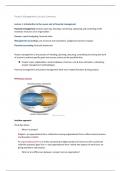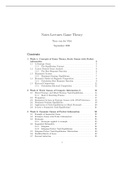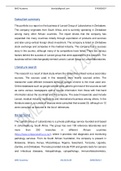Week 1 - Introduction
Part 1: Three questions of lecture 1-5
Three questions of lecture 1-5
1. What is law and what are the functions of law?
a. Have law and its functions changed over the centuries/years?
(Brownsword)
2. What is ‘thinking like a lawyer? What are techniques of reasoning
characteristic/distinctive of legal decision-making (Schauer, Chap. 1)? Have
these techniques changed over the years?
3. What is the relationship between law and morality?
a. What are the (objective) criteria to assess the moral quality of law?
Question 1
What is law?
- Open system of rules and principles (Schauer)
● Written or also unwritten?
● Only rules of the state or also custom and social rules?
Concept of law has changed over time; there are at least four concepts of law
>Four concepts (Brownsword)
- Law 0.0
- Law 1.0
- Law 2.0
- Law 3.0
What are the functions of law?
● Regulation of behavior
○ Deterrence through punishment
■ Horizontal relationship
● Ensuring safety + peace by government
● Coordination
○ Many people in society; to understand and coexist peacefully
● Organization of power of States
● Ensuring general interest
○ Using law as an instrument to achieve certain goals/policies
■ Ex. Education, healthcare, etc.
● Protecting citizens against government
○ Vertical relationship
, - May some times be tensions between protection against government and
protection against other citizens)
= Depends in part on concept of law enforcement
Question 2a
What is ‘thinking like a lawyer’ What and why are techniques of reasoning distinctive of
legal decision-making (Schauer, Chap. 1)?
- In comparison to, for example, policy makers and public decision makers
>Law 1.0 (Brownsword)
Reasoning with general rules which are relatively precise; address behaviour; stem from
an authoritative source; do not have to result in best ‘all-things-considered’ decision
Question 2b
Have these techniques of legal reasoning changed over the last 75 years?
(Brownsword)
Law 1.0
● Law found in 1970s
Law 2.0 (more prominent since 1980s)
● Policy oriented reasoning with rules
● Much more open
● Many about goals instead of behavior
● Authority of source is sometimes disputed
Law 3.0
● Not merely the regulation of new technologies but use of
technologies/architecture to regulate behavior ex ante
○ Make behavior impossible instead of forbidding it
Question 3a
What is the relationship between law and morality?
- What is the relationship between state law and custom?
- Also in regards to social rules
- What is the relationship between law as it is and law is it morally should be?
- Is (very) unjust law nevertheless law?
- Ex. Was the law of Nazi law or too unjust to be considered law?
>Why do we follow the law to begin with?
>What makes punishment legitimate?
- Deterrence (Bentham + Mill (utilitarianism))
, - Humans self-reflect, feel guilty, are self-conscious and so deterrence can
be achieved
- Retribution (Kant (retributivism))
Question 3b
Are there (objective) criteria to assess the moral quality of law? Or is it merely a matter
of personal opinion or feelings?
1. What are the moral boundaries of State interference?
2. How can State punishment be morally justified?
Part 2: what are philosophy of law and e-Thics?
What philosophy is not
It is relatively easy to say what ‘thinking like a lawyer’ is not but more difficult to say
what it is; it is the same for philosophy (of law)
Legal dogmatics & empirical legal sciences
Needed to compare philosophy to both these fields to see what philosophy is not
>Legal dogmatics
Unlike legal dogmatics, philosophy does not take the ‘internal view’ of what legal
scholars, lawyers and judges think they are doing for granted + it does not treat
sources as ‘authoritative’ (do not accept what they say that they think they are doing;
want to investigate it deeper)
● Legal dogmatics:
○ Gives description + interpretation on concepts, judicial decisions, rules for
further implementation
○ Focus on technicalities of specific concepts
○ An addition to legal system; helps make law better
○ Criticizing law within system of law
● Philosophy of law
○ Criticizing law outside system of law; larger scope
○ Focus on other technicalities of specific concepts
■ Critical about fundamentals
● Ex. Question why we should obey courts?
>Empirical legal sciences
Unlike the empirical sciences, philosophy does not look for ‘deeper reality’
Example: empirical sciences would want to look for human biases and prejudices or
physical causes (fatigue/food (what the judge ate for breakfast (Jerome Frank))) as
underlying or deeper causes of legal reasoning
, ● Empirical: focus on law in action
● Philosophy: focus on law in book and concepts
○ Much more abstract
Philosophy
Characteristics of philosophy
1. Broadly cognitive enterprise
a. It does not aim at mere knowledge of facts but more broadly at
understanding
i. Ex. Limiting itself to what a principle states, a rule is, a judgment
made; aims to understand
2. Self-reflexive
a. Aims to understand nature of human beings as reasoning, argumentative
and self-reflexive creatures
i. Focus is on reasoning + argumentation
3. Central task of explication and rational critique of concepts that both shape and
restrain our thinking
a. Does not focus on ‘facts’ and on their truth and falsity but on concepts
that we use to describe facts
>Third characteristics makes distinction most clear
What is a concept?
Like pencils, hammers and scissors, concepts are tools (although intangible)
- They have functions
- Describe, evaluate, etc.
- They can be good or bad at performing their function
- They can be used for different purposes
- These purposes can be good or bad
Philosophy of law
1. Self-reflexive
a. Aims to understand seemingly distinctive ways of legal reasoning and
argumentation (Schauer, p. 5)
2. Explication and critique of concepts
a. In understanding the distinction, focus must be brought on concepts used
for legal reasoning; must explicate and criticise concepts that shape and
restrain the thinking of legal scholars, lawyers and judges and that they
use relatively uncritically
i. Ex. Concepts of law, rule, or principle
1. Lawyers/judges tend to not dive deeper into such concepts
, = So, philosophy of law is…
● Explication and critique of seemingly distinctive way of legal reasoning
● Explication and critique of concepts that shape and restrain thinking and
reasoning of legal scholars, lawyers and judges and that they use relatively
uncritically
Regulation vs disruption
● Function of law is to regulate by offering authoritative rules
● Function of legal dogmatics is to describe ‘law in books’ and offer suggestions
for improvement
● Function of empirical sciences is to describe and explain ‘law in action’
● Function of philosophy (and art) is to disrupt or ‘deregulate’ by questioning and
criticizing generally accepted concepts and ‘authoritative sources’
E-Thics
Normative ethics is a branch of ethics that offers theories and criteria to assess the
moral quality of our character, our actions and decisions + also of law, legal institutions,
rules, principles and the legal system as a whole
- Can use ethics to determine the relationship between law and morality and
assess moral quality (goodness/badness)
Normative ethical theories
1. Deontology
2. Consequentialism/utilitarianism
= So, ethics is…
● Normative theories that offer criteria to assess moral quality of law, legal
decisions, legal institutions, etc.
Part 3: classical image of law: law 1.0
Brownsword Law 1.0, 2.0, 3.0
Brownsword starts from Law 1.0 and does not distinguish Law 0.0
● Law 0.0: commands of sovereign backed by threats
○ No longer in place
● Law 1.0: coherent system of rules
● Law 2.0: instrument to regulate behavior and therewith to realize goals
● Law 3.0: architectural design to regulate and prevent/force behavior
Law 1.0: classical image










